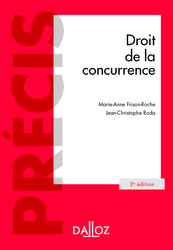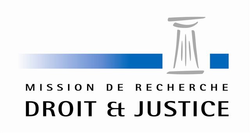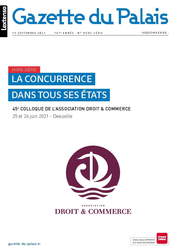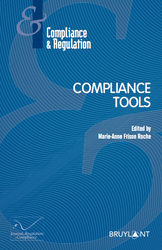Publications [810]
March 31, 2022
Publications

♾️ follow Marie-Anne Frison-Roche on LinkedIn
♾️ subscribe to the Newsletter MAFR Regulation, Compliance, Law
____
► Full Reference: FM.-A. Frison-Roche, La responsabilité ex ante, pilier du droit de la compliance ("Ex-Ante Responsibility, Compliance Law Pillar"), D.2022, chronique MAFR - Droit de la Compliance, Recueil Dalloz, March 31, 2022.
____
► Article English Summary: The Law must help to face the future, which can be totally catastrophic in terms of climate and digital issues. Courts are s best placed for this, without “governing”, only relying on the commitments made by companies, governments, and legislators. On the ordinary Tort Law, court decisions oblige these different entities to be consistent in the commitments they have made, obliging them to act in the future, formal “compliance” with the regulations cannot be sufficient. This ex-ante responsibility, founding the powers, thus constitutes a pillar of a substantial Compliance Law, showing the part that CSR and the companies with a raison d'être play in it.
____
📝 read the article. (written in French)
____
📚go to the presentation of the other articles published in this Chronique Droit de la Compliance made in the Recueil Dalloz.
________
March 23, 2022
Publications

► Full Reference: M.-A. Frison-Roche & J.-Ch. Roda, Droit de la concurrence (Competition Law), 2nd ed., Paris, Dalloz, "Précis" Serie, 2022, 842 p.
____
► This second edition follows on from the first, written with Marie-Stéphane Payet.
📝read the foreword written in dedication to Marie-Stéphane (in French)
____
📕read the 4th cover of the book (in French)
____
► English Summary of the book: Even if reforms follow one another and upheavals are incessant, whether de facto (digital) or political (apprehension of foreign investment, controversies over objectives), the framework of Competition Law is stable, with French Law and European Law in harmony. Competition Law combines both the Law of competitive markets and the Law of relations between economic players. Its age and homogeneity increase its capacity to find solutions. This book restores the coherence and strength of Competition Law, which, once clarified, is easier to master and anticipate.
The first part therefore sets out the blocks of rules that "protect competitive markets", through mechanisms that are increasingly ex ante, not only merger control but also the control of buyer power, leading to the governance of markets by authorities working together, while sanctions for anti-competitive behaviour restore markets that have been damaged by abuse.
The second part sets out the blocks of rules that "rebalance economic relations". The tools used are often older, but their handling is no less innovative.
____
📕read the table of contents of the book (in French)
____
📝read the review of the book made by the Professor Walid Chaiehloudj in the Concurrences review
________
March 17, 2022
Publications
🌐follow Marie-Anne Frison-Roche on LinkedIn
🌐subscribe to the Newsletter MAFR Regulation, Compliance, Law
____
► Full Reference: M.-A. Frison-Roche, "La responsabilité Ex Ante" ("Ex Ante Responsibility"), in Archives de Philosophie du Droit (APD), La responsabilité, t. 63, Dalloz, 2022, pp. 105-115
____
📝read the article (in French)
____
🚧read the bilingual Working Paper which is the basis of this article, with additional developments, technical references and hyperlinks
____
► English Summary of the article: Today, Law is faced with a strategic imperative: to turn its strength towards the future, to deal with issues (digital and climate) over which law and contract do not have the required influence, because they are too local or too unsystemic, while ex post liability is not adequate to deal with the irreparable. Responsibility therefore takes hold of the future, with the judge becoming the central figure in the world through no fault of his own. This shift in time may continue to be anchored in the past, as a result of commitments made by States or firms. But this responsibility for the future, giving rise to an obligation not to make reparation but to do something about it, may come even more directly from the mere fact that the entity in question is ‘in a position’ to act to ensure that others are protected. Pre-constituted evidence, ex ante office of the judge, duty for others, but also powers of the firm and State to bear this ex ante responsibility, pillar of Compliance Law, Law of the future, are the new rules that are being put in place.
________

Updated: Feb. 5, 2022 (Initial publication: Oct. 10, 2021)
Publications

 ► Full Reference: Frison-Roche, M.-A., Duty of Vigilance, Whistleblowing and International Competitiveness, Working Paper, September 2021.
► Full Reference: Frison-Roche, M.-A., Duty of Vigilance, Whistleblowing and International Competitiveness, Working Paper, September 2021.
____
🎤 this Working Paper is the basis for a conference , in the colloquium Effectiveness of Compliance and International Competitiveness, co-organised by the Journal of Regulation & Compliance (JoRC) and the Center for Law and Economics of the Panthéon-Assas University (Paris II), November 4, 2021
____
📝this Working Paper is also the basis for an article. This article is to be published ⤵
in its French version in the book 📕Les buts monumentaux de la Compliance, in the series 📚Régulations & Compliance
in its English version in the book 📘Compliance Monumental Goals, in the series la collection 📚Compliance & Regulation
____
► Working Paper Summary: The "Compliance Tools" are very diverse. If it has been chosen to study more particularly among these the obligation of vigilance and the whistleblower, these rather than others and to study them together, it is because they present in the perspective of the specific topic chosen, namely "international competitiveness", and for companies, and for economic zones considered, and for legal system inseparable from them, a uniqueness: these are mechanisms which release Information.
By order of the law, the company will not only stop ignoring what it covered with the handkerchief that Tartuffe held out to it or that a conception of Company Law legitimately allowed it to ignore. This article does not examine if this revolution made by Compliance Law expresses in the legal system is on the one hand legitimate and on the other hand effective: the article measures what is happening at the regard to "international competitiveness".
Compliance Law is therefore be examined here through its instruments, and not in relation to its normativity. In fact, its instruments are intended to provide Information and to make this information available, in its presentation, in its intelligibility and in the hands of those who are able to use Information in perspective of the Compliance Monumental Goals, achieving them.
Regarding this central notion of Information, international competitiveness will be more particularly concerned because Compliance Law will oblige the company itself to seek out, then expose to everyone's eyes, in particular its competitors, its weaknesses, its projects, its alliances, its flaws. This does not pose a problem if its competitors themselves are often subject to this new branch of Law, which goes far beyond transparency, which is already a new mechanism because a company is not a transparent organization and Competition Law that governs ordinary businesses never required this. But if they are not subject to this incredibly special branch of Law that is Compliance Law, then there is a distortion of competitiveness by the very fact of the Law.
It is possible to pretend that the markets like virtue, that they give it credit because they are themselves based on the idea of "promise", which is ultimately based on a moral concept, but this provision of Information to others, while others remain opaque, is a major problem of competitiveness, which the legal requirement of "loyal commercial practices" only very partially considers.
Therefore, it is necessary to first examine what is the economic and financial power of the information captured by the company on itself thank to Compliance Law making available to all but firstly to the compagny itself through the whistblowing mechanism, organised by the laws, differently in the US and Europe (I). Compliance Law also obliges companies to be accountable not only for what they do but also for what others do for them. Through the obligation of Vigilance, objective Ex Ante obligation and duty, the company obtains a power of Information on others which could well resolve what is often presented as the dispute aporetic of the extraterritoriality of Compliance Law, thus making accountable companies hitherto protected by their "preserved" legal system and thereby affected by the effectiveness of Compliance Law (II).
____
read below the developments

Jan. 5, 2022
Publications

♾️follow Marie-Anne Frison-Roche on LinkedIn
♾️subscribe to the Newsletter MAFR Regulation, Compliance, Law
____
► Full Reference: M.-A. Frison-Roche, Compliance Law and Climate. To prevent Climate Risk and build Climate Balance , January 2022.
, January 2022.
____
🎤 In its French version, this Working Paper had been written for a speech for the colloquium held under the scientific direction of Marta Torre-Schaub, Béatrice Lormeteau, & Anne Stevignon, Les risques climatiques à l’épreuve du droit Comment le droit fait-il face aux nouveaux risques engendrés par la crise climatique ? , at the University Panthéon-Sorbonne (Paris I), Amphithéâtre Liard, on March 17, 2022.
____
📝it is also the basis of an article : "Droit de la compliance et climat. Pour prévenir le risque et construire l'équilibre climatiques" ("Compliance Law and climate. Prevent the climate risk and build the climate balance")
____
► Summary of this Working Paper: Compliance Law is beginning to emerge in climate topic, through the expression "Climate Compliance Law", but the climate issue itself is the most perfect example of why General Compliance Law is made for. It is indeed a new branch of Law, a global Law claiming to provide Ex Ante solutions here and now for global issues, so that in the future systemic catastrophies will not occur, will not happen: it is these "Monumental Goals" that give meaning, coherence, and simplicity to Compliance Law.
Compliance Law, linked to the Rule of Law principle, makes it possible to go beyond the choice often presented between the effectiveness of the protection of the planet and the renunciation of freedoms, in particular the freedom to do business and the freedom of individuals, especially the protection of their data.
Climate is thus exemplary of the object of Monumental Goals of Compliance Law (I). The systemic risk that it now constitutes is analogous to Banking or Digital Systemic Risks and therefore calls for the application of identical legal Compliance Tools, formerly put in place for Banking Regulatory and Compliance Law, recently invented for Digital. Compliance Law, extending Regulation Law, itself from the precondition of the Sector and the Territory, is therefore the branch which makes it possible to put in place new legal solutions, either by force (judicial agreements, compliance programs, etc.), or by will (commitments, global charters, etc.).
Therefore, an alliance can exist between political and public authorities, and crucial economic operators (II), that the rise in power of the "raison d'être" is the sight and whose technical challenge is the collection of information that must be put in correlation. Scientists pooling Information, this public good, provided by public and private entities. The courts are at the center of this articulation between Compliance Law and Climate, which object is the Future.
____
🔓read the developments below⤵️
____

Dec. 24, 2021
Publications

🌐 follow Marie-Anne Frison-Roche on LinkedIn
🌐subscribe to the Newsletter MAFR Regulation, Compliance, Law
____
 ► Full reference: M.-A. Frison-Roche, Conceiving Power, Working Paper, December 2021
► Full reference: M.-A. Frison-Roche, Conceiving Power, Working Paper, December 2021
____
📝 This Working Paper serves as the basis for an article to be published in the collective book drawn up in tribute to Professor Emmanuel Gaillard.
____
► Working Paper summary: In 1985, Emmanuel Gaillard's central work came out under the title Le pouvoir en droit privé (The Power in Private Law)📎
Let's give full force to the original title of the thesis.
The deletion of the term notion perhaps implies that by defining something the essential is done, that there would be something of a pleonasm in aiming at The notion of Power and The Power, as Law likes to economise on words.
But it was indeed a renewed, simpler and more powerful conception of the notion of Power, containing the entire regime necessarily imputed, that this work imposed, henceforth illuminating positive Law. Emmanuel Gaillard's definition, on the other hand, goes beyond Private Law. We would gladly have argued in favour of retaining the heading for the term Notion, proposing instead to dispense with the reference to Private Law alone ....
Perhaps it was because the concept is so vast that in this seminal thesis its scope was restricted to Private Law, since the author already had to account for the sheer multiplicity of manifestations in this part of the legal system; Or perhaps it was because the concept of 'Power' is so familiar in Public Law that it would have needed less definition in Public Law (which, moreover, is so diversely proposed in this more political area, which is already careful on principle to distinguish between powers, which must always be plural in order to be separated), and that it was therefore reasonable to want to arrive at a single concept of Power in Private Law, where the notion of subjective rights is more familiar.
However, Emmanuel Gaillard's definition of Power as a prerogative placed, by legal rule or contract, in the hands of the person invested with them for the benefit, at least in part, of others, covers both Public and Private Law. This even contributes to the solidity of this thesis and explains why it flourishes today in legal systems where the distinction between Private Law and Public Law is weakening.
The power of this definition lies in its simplicity. Simple and brave minds are often the most fruitful. As Dean Gérard Cornu points out in his preface, the author, in particular because he bases himself more on positive law, for example that relating to the powers of corporate officers, does not get bogged down in discussions between authors only to end up preferring one over the other. He arrives at a definition that is close to our everyday experience: the one we experience when we collect an envelope on behalf of someone else and the agent asks us in what capacity we claim to be doing this on his behalf. We then show him our 'power', the legal power to do so for the benefit of the person to whom the letter is addressed, and can thus exercise the power to withdraw the letter, even though it is personal. When legal and common sense come together, it is a good omen, not only in terms of form, because everyone can understand it and the Law must remain comprehensible, but also in terms of substance, because everyone must be able to control the exercise of a power that is exercised for and over others. For this letter addressed to someone else, the person who has been able to take it by virtue of the power conferred on him/her, could just as easily open it and read it, then destroy it or give it to the worst enemy of the person to whom it was addressed. In Power, there is always might to do, and the danger to others that Power contains therefore.
This highly legal definition of Power not only distances the holder from his/her own interests, but also channels the Power thus granted to the person who benefits from it. In this respect, Emmanuel Gaillard not only distinguished between Power and subjective right, but also identified the right amount of power required for this power to effectively fulfill this 'Mission', through the notion of abuse of power, when the holder uses for other beneficiaries this power that was conferred on him/her for this sole purpose.
What is more, this concept makes it possible to distinguish Power from discretionary force, because the holder of Power thereby exercises factual , by acting for others, deciding for others, deciding on others. Because Power is inseparable from might, but might must remain the means of power and no more, the Law shall produce the antibodies that are not only the theory of abuse of power but also an Ex Ante responsibility that accounts must always be rendered, either to the other for whom everything is done or to a third party. For this third party is often there from the outset, the guardianship judge for example: because the Power was put in place because of the beneficiary's weakness, both in himself/herself and because of the situation, an impartial and disinterested third party is needed to ensure proper execution from the outset, without there even being a dispute. In this respect, how useful this thesis is for thinking about what Supervision is today!
This thesis, so clear, so simple and so strong, goes beyond Private or Civil Law. It is both much more restrictive than the more factual and political definition of Oower, which would be the ability to do something, and much broader than the usual definitions, since it embraces and legitimises de jure all situations where a person acts legally for the benefit of another. Dean Cornu shows, moreover, in two sentences that such a notion of power also captures the office of the judge, who has power over others only to serve them 📎
Moreover, Power thus contains its own limit in its very definition, since others are present in it: the holder has power only to serve others. From then on, it is only a power because it is a kind of Charge. Emmanuel Gaillard immediately uses the term: "Un individu se voit confier une charge qu'il exerce dans un intérêt au moins partiellement distinct du sien propre" ("An individual is entrusted with an office which he exercises in an interest at least partially distinct from his own") 📎
This definition offered by Emmanuel Gaillard in 1981, anchored in Private Law only insofar as it is the entire legal system, is premonitory of the Regulatory and Compliance Law as it unfolds today. It would be enough to continue the Gaillard's sentences, as if they had been half-written, to finish them 40 years later and find in them the mechanisms of Supervision of companies by public authorities which are now in place not to reduce their power but to ensure that they exercise it for the benefit of others 📎
The definition of Power thus conceived contains within itself its regime and enables us to anticipate it better today: because the holder exercises Power only for others, at least partially, he is consubstantially accountable for it, responsibility being only one form of this accountability; because this service must be effective and others must benefit fully from it, because unlike the subjective right which allows the holder freely not to use his might, Power has never been the 'most absolute' availability to use his/her might: it is even the opposite. It is the expression of a Power assigned to a purpose, compelling the holder to use his/her Power to that end. But it is equally necessary for the holder to have all the might to do so, otherwise the very notion of 'Power' is meaningless. This is the definition that should be given to the principle of Proportionality: the person on whom the Power rests must have not more power than is necessary, but all the power necessary to achieve the Monumental Goals for which the Power has been entrusted to him/her, so that others may derive full benefit from it (II).
In today's positive Law, the definition of Power as a Duty is found not only in Private Law but also in Public Law, not least because pure might, i.e. those that do not account for the use of their might, are in decline while concern for others is on the increase. The days of discretionary powers are over, and the increased independence of those who exercise Power over others requires them to be accountable. Beyond this Accountability, the personal Responsibility of those who have the Power to serve others is being established. But, no doubt because the Law is slow to evolve, the correlative idea that the holder of Power must have all the powers required to carry out his/her mission is less entrenched: As Emmanuel Gaillard has shown, the Law has only gone part of the way in sanctioning excesses of power, when the holder uses his/her power for other goals, but it has not yet clearly established that the holder - sometimes forced - of a Power is legitimate in using all the means required to achieve the result for which this Power, i.e. a charge and a duty, has been conferred on him/her.
No doubt we need to read Emmanuel Gaillard's thesis again in all its potential, to imagine the reading we could do today of what he could have written as if on blank pages that would write themselves, a magical thesis where everything is already there, a thesis so short (250 pages) and so beautiful, so dense that it already contains the Law of the Future. The Law of the Future 📎
____
Lire les développement ci-dessous⤵
Gaillard, E., Le pouvoir en droit privé, préf. Cornu. G., coll. ..., Economica, 1985.
Gaillard, E., La notion de pouvoir en droit privé, thèse .... ;
"En droit processuel, l'office du juge aurait donné à l'auteur un renfort. Pour le juge, il n'est point de pouvoir sans devoir. Au-delà de la distinction de ce qu'il a obligation de faire ou faculté d'apprécier, il y a toujours, au creux de ce qu'il peut, le sceau de ce qu'il doit, un devoir gardien - comme un âme - de l'exercice du pouvoir." (p.5).
n°3, p.9.
🕴️J. Carbonnier, 📗Essai sur les lois, 1992 (on the guardianship).
S. in a general way, 🕴️M.-A. Frison-Roche (ed.), 📕Régulation, Supervision, Compliance, 2017.
Cornu, préface précitée : "Tous les pouvoirs sont, à double face, des pouvoirs-devoirs" (p.5).
On Compliance Law as a Law of the Future, s. 🕴️M.-A. Frison-Roche, 📝Compliance Monumental Goals, beating heart of Compliance Law, in 🕴️M.-A. Frison-Roche (ed.), 📘Compliance Monumental Goals, 2023.
On the consequences for Liability Law, which is now looking to the Future, s. 🕴️M.-A. Frison-Roche, 🚧Ex Ante Responsibility, 2021.
Sur la notion de "Responsabilité Ex Ante", v. Frison-Roche, M.-A., La responsabilité Ex Ante", in Archives de Philosophie du Droit, La responsabilité, 2022.
Nov. 4, 2021
Publications

► Full Reference: M.-A. Frison-Roche, " Assessment of whistleblowing and the obligation of vigilance regarding international competitiveness", in M.A. Frison-Roche (ed.), Compliance Monumental Goals, series "Compliance & Regulation", Journal of Regulation & Compliance (JoRC) et Bruylant, 2023, p.
____
► Article Summary: Taking up the legal tools of Compliance and confronting them with the concern that Law must have for the Competitiveness of companies, it is necessary that these legal instruments not harm it because Compliance Law, because of its immense ambitions, can only function through an alliance between political wills with great pretensions (save the planet) and the entities which are able to achieve these goals (the crucial economic operators : the political drawing on the compagnies" power, it would be contradictory for the legal instruments put in place by Law to harm the ability of companies to face global economic competition, or worse to favor international competitors acting under legal systems which do not integrate Compliance obligations.
From this principle, it is possible to assess these two legal techniques of whistleblowing and vigilance obligation: both consist in capturing Information, which gives them a strong uniqueness and fits them into the global competition for Information.
Taking the whistleblowing, its first beneficiary is the company itself since the firm discovers a weakness and can therefore remedy it. Therefore, beyond the principle of protection of the whistleblower by their access to the legal statute, for instance the one conceived by the French 2016 law known as "Sapin 2", it is questionable that all the incentives are not put in place so that the holder of such information transmits it to the manager. It is not the European solution, even after the European Directive of 2019, national legal systems continuing to require the absence of financial compensation, the "heroic figure of the whistleblower and the refusal of their remuneration depriving the company of Information and improvement. First to the manager, with external transmission taking place if the latter does nothing, the internal manager is thus encouraged to act and put an end to the dysfunction, which increases the competitiveness of the company.
But the French legislation has on the contrary developed the right incentive as to the person to whom the information is transmitted because by obliging to transmit first to the manager, the external transmission intervening if the internal management does nothing, the incentive is thus made to the internal manager to act and put an end to the dysfunction, this legal solution increasing the competitiveness of the company.
Even more, and even if it seems counter-intuitive, the obligation of vigilance increases the competitiveness of the obliged companies. Indeed, Law by obliging them to prevent and fight against violations of human rights and the environment has tacitly given them all the necessary powers to do so, notably the power to collect Information on third-party companies, including (and even above all) those which are not subject to transparency obligations. In this respect, companies, as far as they are personally responsible, hold supervisory power over others, a power which allows to globalize Compliance Law and which, in the process, increases the Companies' own power. Therefore, the obligation of vigilance is in many respects a boon for the companies which are subject to it. The resumption of the mechanism by the next European Directive, itself indifferent to the territory, will only strengthen this global power of vigilant companies over possibly foreign companies which become its passive subjects.
____
🚧 read the bilingual Working Paper, basis for this article
____
____
► read the presentations of the other Marie-Anne Frison-Roche's contributions in this book:
📝Compliance Monumental Goals, beating heart of Compliance Law,
📝Definition of Principe of Proportionality and Definition of Compliance Law,
📝 Role and Place of Companies in the Creation and Effectiveness of Compliance Law in Crisis,
__________

Oct. 22, 2021
Publications

 ► Référence complète : Frison-Roche, M.-A., Le principe de proximité systémique active, corolaire du renouvellement du Principe de Souveraineté par le Droit de la Compliance, document de travail, octobre 2021
► Référence complète : Frison-Roche, M.-A., Le principe de proximité systémique active, corolaire du renouvellement du Principe de Souveraineté par le Droit de la Compliance, document de travail, octobre 2021
____
🎤 Ce document de travail avait été élaboré pour servi de base à l'intervention de clôture du colloque Effectivité de la Compliance et Compétitivité internationale, coorganisé par le Journal of Regulation & Compliance (JoRC) et le Centre de recherche en Droit et en Économie de l'Université Panthéon-Assas (Paris II), se tenant le 4 novembre 2021, Salle des Conseils, Université Panthéon-Assas (Paris II).
🚧Il était corrélé à un premier document de travail ayant pour thème l'Appréciation du lancement d'alerte et de l'obligation de vigilance au regard de la compétitivité internationale, élaboré également pour ce colloque.
La gestion du temps n'a permis que la prise de parole sur ce thème-ci relatif aux techniques juridiques du lancement d'alerte et de l'obligation et devoir de vigilance.
____
📝Ce présent document de travail a donc été ultérieurement utilisé pour constituer la base d'un article, Le principe de proximité systémique active, corolaire du renouvellement du Principe de Souveraineté par le Droit de la Compliance, lequel est publié⤵
📕dans sa version française dans l'ouvrage Les buts monumentaux de la Compliance, dans la collection 📚 Régulations & Compliance
📘dans sa version anglaise dans l'ouvrage Compliance Monumental Goals, dans la collection 📚 Compliance & Regulation
____
► Résumé du document de travail : Les rapports entre le Droit de la Compliance et la notion de Souveraineté sont abîmés par une mauvaise querelle de départ, souvent appelée celle de "l'extraterritorialité du Droit de la Compliance", elle-même qualifiée en tant que telle comme une attaque à la Souveraineté des Etats, une sorte de guerre contre cette sorte de population civile que sont "ses" entreprises, frappées par des sanctions économiques. Dans une confusion juridique générale, oscillant entre panique et rage, entre le cas pourtant si particulier des embargos décrétés par un Etat contre un autre, une contamination s'est faite avec la question plus vaste des sanctions économiques internationales, puis avec le Droit de la Compliance, lui-même réduit ainsi à n'être qu'une petite partie du Droit pénal international.
Le Droit de la Compliance, présenté comme outil masqué de guerre entre Etats, en a été d'une part profondément dénaturé. D'autre part, toutes les forces ont été mobilisées pour "réagir" et frapper en retour ou à tout le moins "bloquer", ou, si l'on ne pouvait rien faire d'autre, recopier l'arsenal, limitant la Compliance à la question de la corruption.
C'était réduire le Droit de la Compliance à peu, alors que nous avons tant besoin de sa force et qu'il exprime au contraire la puissance du Juridique lui-même dans un espace supra-national où les Etats sont peu présents. Ils sont peu présents parce que le territoire lui-même s'y dérobe et que les Etats demeurent liés au territoire. Or, la finance, le numérique et le spatial, ces grands enjeux de Régulation ont besoin de limites, parce que les êtres humains, même faibles, ne doivent pas être broyés par plus forts qu'eux. Non, la civilisation, essentiellement liée à la limite, ne doit pas se perdre dans ces nouveaux espaces.
Or, la Souveraineté ne s'exprime pas dans la toute-puissance, ce sont les petits-enfants et les tyrans qui pensent cela. Elle s'exprime dans la limite, que le sujet se donne et qu'il donne. Le Droit de la Compliance, prolongeant en cela le Droit de la Régulation, est ce qui est en train de donner des limites à ces trois espaces sans territoire que sont la finance, le numérique et le spatial. En ce qu'il appréhende directement les risques globaux qui se jouent des territoires, par exemple le risque climatique. En ce qu'il limite les discours de haine qui nie l'idée de civilisation dans l'espace numérique. En ce qu'il se saisit directement de l'avenir. En ce qu'il noue directement une alliance entre les Autorités politiques et les Opérateurs cruciaux en Ex Ante
C'est pourquoi sur la base du Droit de la Compliance l'Europe numérique souveraine s'élabore, l'industrie d'un cloud souverain se construit. Ainsi le Droit de la Compliance n'est pas l'ennemi de la Souveraineté, c'est le contraire : il est ce par quoi la Souveraineté va se déployer dans un monde qui doit se penser sans territoire en mettant pourtant le projet politique en son cœur.
Pour cela il faut construire un nouveau principe, qui est l'inverse de la fermeture et de l'exclusion, correspondant au projet de l'Europe souveraine : celui de la "proximité systémique active.
____
Lire ci-dessous les développements⤵️

Oct. 22, 2021
Publications
 ► Référence complète : Frison-Roche, M.-A., Compétitivité des mécanismes d'alertes et des obligations de vigilance, document de travail, juillet 2021.
► Référence complète : Frison-Roche, M.-A., Compétitivité des mécanismes d'alertes et des obligations de vigilance, document de travail, juillet 2021.
____
🎤 ce document de travail sert de base à une conférence, dans le colloque Effectivité de la Compliance et Compétitivité internationale, coorganisé par le Journal of Regulation & Compliance (JoRC) et le Laboratoire d'économie du droit de l'Université Panthéon-Assas), se tenant le 4 novembre 2021, Salle des Conseils, Université Panthéon-Assas (Paris II).
____
📝Ce document de travail constitue aussi la base d'un article. Cet article sera publié ⤵
📕dans sa version française dans l'ouvrage Les buts monumentaux de la Compliance, dans la collection 
📘dans sa version anglaise dans l'ouvrage Compliance Monumental Goals, dans la collection 
____
► Résumé du document de travail : Les "outils de la compliance" sont très divers. S'il a été choisi de traiter plus particulièrement parmi ceux-ci l'obligation de vigilance et le lanceur d'alerte, ceux-là plutôt que d'autres et de les réunir, c'est parce qu'ils présentent au regard du sujet spécifique choisi, à savoir "la compétitivité internationale", et celle des entreprises, et celle de la zone économique considérée, et du système juridique indissociable de celle-ci, une unité : ce sont des mécanismes qui font sortir de l'information.
Sur ordre de la Loi, l'entreprise va non seulement cesser d'ignorer ce qu'elle recouvrait du mouchoir que Tartuffe le tendait ou qu'une conception du Droit des sociétés lui permettait légitimement d'ignorer. Il ne s'agit pas ici d'examiner si cette révolution que le Droit de la Compliance exprime dans le système juridique est d'une part légitime et d'autre part effective, mais d'essayer de mesurer ce qu'il en est au regard de la "Compétitivité internationale".
Le Droit de la Compliance sera donc ici examiné à travers ses instruments (et non par rapport à sa normativité, laquelle réside dans ses "Buts Monumentaux"). Or, ses instruments ont pour objet l'information et la mise à disposition de cette information, dans sa présentation, dans son intelligibilité et surtout dans les mains de ceux qui sont aptes à en faire "bon usage" pour que les Buts du Droit de la Compliance soient atteints.
Au regard de cette notion centrale qu'est l'information,la compétitivité internationale va être plus particulièrement concernée parce que le Droit de la Compliance va obliger l'entreprise à aller elle-même rechercher, puis exposer au regard de tous, notamment de ses concurrents, ses faiblesses, ses projets, ses alliances, ses failles. Cela ne pose pas de difficulté si ses compétiteurs sont eux-mêmes souvent à cette nouvelle loi, qui va bien au-delà de la transparence, laquelle est déjà un mécanisme nouveau car une entreprise n'est pas une organisation transparente et le Droit de la concurrence qui régit les entreprises ordinaires n'a jamais exigé cela, régit également les compétiteurs. Mais si ceux-ci ne sont pas soumis à cette loi si particulière qu'est le Droit de la Compliance, alors il y a distorsion de compétitivité du fait même du Droit.
Certes, l'on peut dire que les marchés aiment la vertu, qu'ils lui accordent crédit car ils sont eux-mêmes basés sur l'idée de "promesse", laquelle repose ultimement sur un concept moral, mais cette mise à disposition d'informations multiples à autrui, lequel autrui demeure opaque est un problème majeur de compétitivité, que le concept de "loyauté des pratiques commerciale" ne prend que très partiellement en charte.
C'est pourquoi il convient d'examiner tout d'abord ce qu'il en est de la puissance économique et financière de l'information captée par l'entreprise sur elle-même que le Droit de la Compliance peut rendre disponible à tous, ce qui produit une asymétrie de puissance à laquelle le Droit de la Compliance ne semble pas avoir encore répondu (I). Mais le Droit de la Compliance oblige aussi les entreprises à rendre compte non seulement à ce qu'elles font mais encore à ce que font les autres pour elles. A travers l'obligation de vigilance, obligation objective et Ex Ante, à laquelle s'arrive le pouvoir du lanceur d'alerte, l'entreprise obtient un pouvoir d'information sur autrui qui pourrait bien résoudre ce qui est souvent présentée comme la dispute aporétique de l'extraterritorialité du Droit de la Compliance, rendant alors comptable les entreprises jusqu'ici protégées par leur système juridique "préservé" et atteint de ce fait par l'effectivité du Droit de la Compliance (II).

Oct. 20, 2021
Publications

🌐follow Marie-Anne Frison-Roche on LinkedIn
🌐subscribe to the Newsletter MAFR Regulation, Compliance, Law
____
 ► Full Reference: M.-A. Frison-Roche, Support from Compliance Law for day-to-day management of Competition Law, Working Paper, Octobre 2021.
► Full Reference: M.-A. Frison-Roche, Support from Compliance Law for day-to-day management of Competition Law, Working Paper, Octobre 2021.
_____
► This working paper has been drawn up as a basis for a contribution to the Amicorum Liber for Professor Laurence Idot, published in 2022
____
► Working Paper Summary: Competition Law has become so huge and just "regulations" that one would give up trying to understand it as a whole, preferring to become a specialist in one of its parts. This would be to lose sight of the simple and strong reason which unites the whole and gives it its breath: Freedom. Freedom experienced by the person in his daily economic action, Freedom kept by Competition Law, always returning to its principle: Free Competition. This is why the European Union places a so great emphasis on Competition. To build it and keep it effective, "Competition Policy" is articulated with Competition Law, but if authorities and judges do not blame companies for their power, they do not rely on it. To do this, they must then be supported by Compliance Law, which strongly encourages companies to act for the effectiveness and the promotion of Competition principles. Competition Law thus slips from the Ex Post to the Ex Ante, with the commitments of companies leading them to stop being passive and punished in order to become convinced players and educators of the others. Something pleasant for a great professor of Competition Law, to whom tribute is paid here.
____
🔓read the Working Paper below⤵

Updated: Sept. 25, 2021 (Initial publication: March 25, 2021)
Publications

 ► Référence complète : Frison-Roche, M.-A., Instituer l'insécurité juridique comme principe, outil de prévention des crises systémiques catastrophiques totales, document de travail, mars et septembre 2021.
► Référence complète : Frison-Roche, M.-A., Instituer l'insécurité juridique comme principe, outil de prévention des crises systémiques catastrophiques totales, document de travail, mars et septembre 2021.
____
► Ce document de travail fait suite à deux précédents documents de travail, réalisés pour le colloque qui s'est tenu à la Cour de cassation le 22 mars 2021.
Le premier avait été conçu et en partie réalisé longtemps avant sa tenue pour traiter le sujet selon les canons habituels attendus ;
Le second a été élaboré le veille de sa tenue sur 4 cas car la disparition de mes serveurs en raison d'un incendie, ayant également touché les copies de ceux-ci ne me permettait pas autre chose, les organisateurs m'ayant demandé de maintenir pourtant ma participation, ce dont je les remercie 📎
Le présent document de travail a été élaboré après la tenue du colloque afin que les organisateurs de ce colloque, au thème si aventureux, ne pensent pas qu'ils ne pouvaient pas compter sur moi.
Ce document de travail vise à dépasser ces avanies et à opérer la connexion du sujet pour lequel une contribution m'a été demandée (la crise économique) avec le sujet plus général qui me retient par ailleurs : la construction de la nouvelle branche qu'est le Droit de la Compliance, pourquoi le faire et comment le faire.
____
Introduction : Comme à tous, ce sujet de "L'insécurité juridique" me pose difficulté. Parce que, n'étant pas grand personnage solitaire affrontant l'inconnu, comme tous les autres je voudrais plutôt la sécurité que l'insécurité, et tous les mots qui ne commencent pas par une négation : je voudrais le connu plutôt l'inconnu, je voudrais être comprise qu'incomprise, et ce n'est plus par confort que par urgence morale je voudrais vivre dans un monde juste plutôt que dans un monde injuste. C'est d'ailleurs pour cette dernière raison que je vais affronter l'aventure de l'Insécurité juridique comme principe premier, et non pas comme exception au principe de la Sécurité juridique 📎
Cet ajout du "in" signale paradoxalement un retranchement : le "in" montre ce qui manque, comme le monde blessé qu'est le monde injuste. Me voilà invitée à traiter un sujet par avance abîmé, car l'insécurité juridique c'est déjà comme une agression : un monde amputé de sa sécurité, comme c'est désagréable.
C'est encore plus vrai pour "l'insécurité juridique". En effet, la notion fait face à la "sécurité juridique", cette sorte d'apport spécifique que le Droit offre au monde. La "sécurité juridique" est aujourd'hui comme un Totem, qui serait indissociable du Tabou de l'Insécurité. Dans le monde juridique épuisé dans lequel nous ne serions plus aptes qu'à proposer quelques notions procédurales, surtout pas de notions substantielles car immédiatement taxées d'être trop politiques 📎
La sécurité juridique, parce que les systèmes juridiques n'auraient plus que cela à offrir, revendiquant par ailleurs leur neutralité et se rejoignant donc sur cette constance, cette cohérence, et cette confiance produites par cette sécurité, est notre nouveau doudou.
A cela, l'on apporte nuances dans les modalités, en soulignant que les circonstances changeantes de la vie exigent un peu de flexibilité, que le pragmatisme et des situations concrètes et particulières qui sans cesse varient impliquent de prévoir dès aujourd'hui que demain le contexte aura changé : il faut organiser de la prévisibilité dans le changement. De cela, le Droit souple s'en charge, les lignes directrices étant les nouvelles voies romaines qui nous montreront le chemin. Sécurité et flexibilité, dans un pragmatisme qui voit dans tout principe substantiel un signe de rigidité, voilà notre nouveau mantra.
L'insécurité juridique est ainsi notre Tabou, dont les admissions justifiées seraient autant d'hommages rendus au Totem de la sécurité juridique, Totem et Tabou se renforçant toujours. Il y aurait donc imperfection du système juridique si l'on haussait l'insécurité au rang de véritable principe. C'est pourquoi lorsqu'on fait l'effort de parler d'insécurité juridique, on semble ne le faire que sur le mode de l'exception : l'insécurité juridique, cela serait ce qu'il est admissible de supporter comme exception légitime au principe de la sécurité juridique 📎
L'on aura donc tendance à traiter de l'insécurité juridique comme une sorte de principe supportable lorsque quelque chose justifie qu'on porte atteinte au véritable principe premier qu'est la Sécurité juridique. C'est ailleurs ainsi le plus souvent qu'on l'aborde . Ce n'est donc pas le traiter comme un véritable principe, juste comme une exception supportable.
Voilà pourquoi l'on m'a demandé d'examiner si l'insécurité juridique était supportable, admissible, lorsqu'il y a crise économique. Sans doute parce que lorsqu'il y a crise économique, alors tant pis les principes doivent un peu baisser pavillon et l'on fait avec les moyens du bord en admettant des exceptions, bien qu'avec beaucoup de réticences et de regrets 📎
L'insécurité juridique n'aurait donc qu'un temps, parce que par nature la crise elle-même n'a qu'un temps. La fin de la crise, la fin des problèmes et d'une situation anormale feraient disparaître le principe d'insécurité juridique, lequel serait donc un principe pathologique.
Mais ce n'est pas parce que cette description semble partagée par beaucoup que ses prémisses soient exacts. En effet, la "crise" est-elle si exceptionnelle que ce qui justifie que l'insécurité juridique, qui permet d'aider à sa résolution, le soit aussi ? Si l'on constate plutôt que la crise est non seulement notre "ordinaire", et qu'en plus notre "ordinaire catastrophique" est "prévisible", voire virtuellement déjà là, et qu'en plus dans le futur, ce qui risque d'arriver est une crise catastrophique totale qui pourrait bien être définitive dans ses effets (ce qui enlève à la crise sa nature temporaire et le retour au "vrai principe" également), alors le principe exceptionnel, cantonné dans la crise, doit sortir de l'hypothèse de celle-ci pour venir pleinement dans le Droit présent afin d'empêcher que se réalise cet ordinaire catastrophique.
Oui, regardons vers le futur : ne sont-ce pas de monumentales crises qui sont devant nous ? Et l'enjeu n'est-il pas d'adopter des principes premiers pour qu'elles n'adviennent pas ? S'il en est ainsi, alors l'absence de changement, la constance et le prévisible, c'est-à-dire le principe même de la Sécurité juridique, si choyé, n'est-ce pas ce qui fait obstacle à la prévention de l'advenance des crises économiques qui nous menacent ? Certes c'est sans doute une crise sanitaire et une crise écologique et climatique qui nous sont devant nous, mais de la même façon la crise économique de 2020 n'est elle-même qu'un accessoire de la crise sanitaire mondiale, prémisses de ce qui pourrait arriver.
Si nous sommes dans cette situation mondiale alors, ce n'est pas une conception procédurale des principes qu'il faut retenir, mais une conception politique. De la même façon, dans cette perspective ce n'est pas en terme d'exception, de "principe exceptionnel" mais bien en terme de principe premier qu'il faut penser l'Insécurité juridique, c'est-à-dire en terme d'éveil et d'aventure, car demain pourrait n'être pas du tout comme aujourd'hui. Seul le principe inverse de l' "Insécurité juridique" pourrait alors exprimer la volonté d'y répondre (II).
_____
► Lire ci-dessous les développements du document de travail ⤵
L'incendie d'OVH peut simplement être pris comme un exemple de crise. V. infra ⤵
Ce qui occupe la seconde partie de la présente étude.
Ainsi le Droit de la Compliance a longtemps été présenté comme une simple procédure d'effectivité des règles, ce qui rassure, plutôt que ce qui est sa définition substantielle, à savoir des "Buts Monumentaux", notamment sociaux et climatiques, qui lui donne toute son ampleur et révèle sa nature profondément politique. V. Frison-Roche, M.-A. ✏️Notes pour une synthèse opérée sur le vif des travaux du colloque : "Les Buts Monumentaux du Droit de la Compliance : radioscopie d'une notion" la notion de Buts Monumentaux du Droit de la Compliance, 2021 ; et voir plus généralement Frison-Roche, M.-A. (dir), 📕 Les Buts Monumentaux de la Compliance, 2022.
Contre cela, Frison-Roche, M.-A., Non, je n'aime pas la réglementation, septembre 2021.
Il en est de même du principe de proportionnalité. Mais là aussi il serait adéquat de penser les choses différemment. Voir une démonstration dans ce sens, Frison-Roche, M.-A., Définition de la proportionnalité et Définition du Droit de la Compliance, 2021.
Pour une description du choc que la loi déclarant "l'Etat d'urgence sanitaire" fit sur la doctrine juridique, Gelbrat, A. et , Etat d'urgence sanitaire : la doctrine dans tous ses états, 2020.
Ce sont souvent dans ces termes que la doctrine s'exprime. Par exemple 📝Kamgaing, P.-C., Crise sanitaire et procédures judiciaires : étude de droit processuel, 2020, évoquant le fait que le droit processuel est "bafoué".
Sept. 23, 2021
Publications

► Full Reference: Frison-Roche, M.-A., Le rôle du juge dans le Droit de la Compliance ("The role of the Judge in Compliance Law"), in Frison-Roche, M.-A. (ed.), La juridictionnalisation de la Compliance, series "Régulations & Compliance", Journal of Regulation & Compliance (JoRC) & Dalloz, to be published.
____
► The summary below describe an article corresponding to a Working Papier prepared for an intervention in the colloquium Quels juges pour la Compliance ? , coorganisé par le Journal of Regulation & Compliance (JoRC) et par le Centre de Recherche en Droit de l'Université Paris Dauphine-PSL (CR2D). Ce colloque a été conçu par Marie-Anne Frison-Roche, Juliette Morel-Morager et Sophie Schiller, codirectrices scientifiques, et s'est déroulé à Paris le 23 septembre 2021.
Dans l'ouvrage, l'article sera publié dans le Titre IV.
____
► Article Summary:
____
_______
Sept. 22, 2021
Publications

► Full Reference: Frison-Roche, M.-A., Ne jamais se passer des juges et des avocats dans le Droit de la Compliance ("Never exclude Judges and Lawyers in Compliance Law"), in Frison-Roche, M.-A. (ed.), La juridictionnalisation de la Compliance, series "Régulations & Compliance", Journal of Regulation & Compliance (JoRC) & Dalloz, to be published.
____
► Le résumé ci-dessous décrit un article qui fait suite à une intervention dans le colloque Quels juges pour la Compliance ? , coorganisé par le Journal of Regulation & Compliance (JoRC) et par le Centre de Recherche en Droit de l'Université Paris Dauphine-PSL (CR2D). Ce colloque a été conçu par Marie-Anne Frison-Roche, Juliette Morel-Morager et Sophie Schiller, codirectrices scientifiques, et s'est déroulé à Paris le 23 septembre 2021.
Dans l'ouvrage, l'article sera publié dans le Titre IV.
____
► Article Summary: Before examining the issue of the role of the Judges in Compliance Law, it is necessary to ask the preliminary question : is it useful to tolerate the Judge and/or the Lawyers presence in Compliance Law ?
This question of their presence or their absence, because they would be useless, even harmful to the Compliance effectiveness, either judges, or lawyers, or both together, is indeed the prerequisite for the reflection of " Which judges for Compliance? " because if we think of Compliance exclusively through the Ex Ante and efficiency, as it is often done in the West through artificial intelligence or in China in a system of surveillance and economic, technological and political efficiency , there is neither judge nor lawyer.
But It is indeed imperative to always keep in mind the need to never exclude Judges from Compliance systems, although this can be conceivable since they are Ex Ante mechanisms, which often aim by nature to avoid the trial. (example of the Differed Prosecution Agreement), because when there is a judge, the procedural mechanisms and Due Process principle are associated with it: the power of Compliance Law does not go wrong.
However, Compliance Law is the Law of the future, that which will seize the immense challenges to be resolved today for tomorrow and it is not from the specific laws against corruption, such as FCPA or the French law known as "Sapin 2 law", which are only examples, but from two enormous "monumental" subjects that are on the one hand Data and on the other hand Climate that Compliance Law is building, with the means that are required. But so that the rule "all the means necessary for the ends", which already tended to govern Regulatory Law of which Compliance Law is the exponential extension, does not carry all, one needs lawyers. Because the lawyers contradict. And ask. Ask judges and carry the actions of ordinary people for their subjective rights to be shaped. As Motulsky affirmed it in its thesis, written during the Second World War, before inventing - after this enormous systemic disaster - the "general procedural law".
____
_______
Updated: Sept. 18, 2021 (Initial publication: Sept. 10, 1999)
Publications

► Référence complète : Frison-Roche, M.-A., Droit, finance, autorité. Sociologie comparée des autorités de marchés financiers, recherches menées puis rapport rédigé pour le Laboratoire de sociologie juridique, Université Panthéon-Assas (Paris II), remis au GIP Mission de recherche Droit et justice, septembre 1999, dactyl., 117 p.
____
📝 Lire la table des matières de l'ouvrage.
____
📝 Lire le résumé et la synthèse de l'ouvrage en 4 pages.
____
📝 Lire le rapport
____
►Lire les deux monographies accompagnant le rapport :
📝 Bouthinon-Dumas, H., Le rôle des autorités de marchés financiers dans la crise asiatique vue à travers la presse
📝 V. Magnier, Les autorités de marchés financiers aux Etats-Unis. Droit, juge et autorité de marché
____
📝 Lire les synthèses concernant les différents pays étudiés
📝 Lire la grille d'entretien semi-ouvert
________

Sept. 16, 2021
Publications

 Full Reference: Frison-Roche, M.-A., Notes pour une synthèse sur le vif pour le colloque "Les Buts Monumentaux de la Compliance : radioscopie d'une notion" (Notes for an on the fly synthesis for the Colloquium "The Compliance Monumental Goals: Radioscopy for a Notion"), September 16, 2021.
Full Reference: Frison-Roche, M.-A., Notes pour une synthèse sur le vif pour le colloque "Les Buts Monumentaux de la Compliance : radioscopie d'une notion" (Notes for an on the fly synthesis for the Colloquium "The Compliance Monumental Goals: Radioscopy for a Notion"), September 16, 2021.
____
► Read the general programme of the Colloquium Compliance Law Monumental Goals
► Read the presentation of the synthesis Report, notably its Summary.
____
► Methodology: The topic is not treated in a strictly personal point of view, as it will be in the book on The Compliance Monumental Goals, in an article devoted to "Defining Compliance Monumental Goals and their branch of Law", more personal article. It will be even more clearly the expression of a personal vision of the definition of what is "Compliance" and what is "Compliance Law", with in particular the distinctions that should be done, in particular with "conformity" because these are these "Monumental Goals", a notion proposed in 2016!footnote-2164 which makes it possible to distinguish the procedural notion of "conformity" (just obey) and the substantive notion of "Compliance Law". This article will include the multiple academic and technical references that should be done to do this.
But in the time allotted in a day's collloquium and because the purpose of a synthesis is to highlight on the spot what was common in the contributions heard, the document is based only on the different speechs made and is not enriched with technical references, nor does it refer to personal works.
____
🔻read below the notes exhaustely taken

Sept. 15, 2021
Publications

 ► Full Reference: M.-A. Frison-Roche, Ex Ante Responsibility, Working Paper, December 2021.
► Full Reference: M.-A. Frison-Roche, Ex Ante Responsibility, Working Paper, December 2021.
____
📝This Working Paper has been the basis for an article written in French, "La responsabilité Ex Ante", published in the Archives de Philosophie du droit (APD), in the book 📗La Responsabilité (2022).
____
► Working Paper Summary: Quel est le temps auquel s'articule la responsabilité ? La question est si classique que toutes les réponses ont été dessinées : si l'on est responsable plus aisément par rapport au temps, car l'on peut alors plus aisément faire un lien entre la situation appréhendée, sa réalisation dans le passé la rendant plus facilement connaissable, et le poids de "responsabilité" que l'on impute sur une personne, l'on peut articuler la responsabilité avec le futur. Si l'on brise le poids de cette responsabilité avec un évènement ou une situation, par exemple. Le Principe Responsabilité de Jonas ou l'Ethique de la Responsabilité font ainsi voyager la Responsabilité dans le temps, par un rapport entre le Droit et l'Ethique.
D'ailleurs l'on pourrait soutenir que le Droit peut faire ce qu'il veut et imputer une responsabilité à quiconque pour le temps qu'il désigne, par exemple désigne comme porteur d'une responsabilité, c'est-à-dire d'un poids, celui qu'il veut. Le "responsable" serait alors le titulaire d'une sorte de "poids pur", qui le charge parce que le Droit l'a voulu pour le temps qu'il veut, par exemple un devoir d'agir pour que le futur soit dessiné comme le veut le Droit, alors même que le Responsable n'a rien à se reprocher dans le passé.
Mais les Cours constitutionnelle défendent un rapport minimal entre la Responsabilité et le poids que celle-ci fait porter une personne, fut-t-elle morale, gardant ainsi le lien consubstantiel entre le Droit et la Morale, la technique juridique de la Responsabilité ne pouvant équivaloir à celle d'un prélèvement obligatoire.
Ainsi l'idée d'une Responsabilité Ex Ante est simple dans son principe (I). Elle est celle d'un poids juridiquement posé sur une personne soit par elle-même (engagement), soit par la Loi ou par le Juge sur une personne de faire quelque chose pour que n'advienne pas quelque chose qui adviendrait ou pour qu'advienne quelque chose qui n'adviendrait pas si elle ne le faisait pas.
Mais les conditions juridiques pour admettre un tel poids alors même que le lien avec une situation passée serait brisé est plus difficile (II). On continue certes continuer à voir dans le futur le passé, ce qui facilite le voyage dans le temps, et fonda par exemple le contrôle Ex Ante du contrôle des concentrations. Mais l'on peut se briser même de cette facilité et regarder non plus le rapport entre le passé et le futur, mais le présent et le futur : ce que l'on sait déjà aujourd'hui du futur, ce qui met en jeu le rapport entre le Droit et la Science ; ce que l'on observe de l'emprise de la personne présente sur le moment présent, c'est-à-dire le Pouvoir, ce qui fait en jeu le rapport entre le Droit et l'Economie politique.
Dans cette dimension-là, la contrainte de la Responsabilité Ex Ante est alors maniée par le Juge, dont l'office lui-même devient un office Ex Ante. Les pouvoirs obligés Ex Ante par une telle responsabilité maniée par le Juge étaient les personnes en situation de pouvoir, sont non seulement les entreprises, mais encore les Etats, qui perdent le privilège - partagé avec les contractants - de disposer juridiquement du futur, et notamment en leur sein le Législateur.
Une telle révolution, qui se déroule sous nos yeux, s'explique parce qu'il faut agir maintenant pour que le futur ne soit pas catastrophique. La science nous informe qu'il le sera entéléchiquement. Il est donc juridiquement requis de désigner des responsables, non pas parce qu'ils auraient fait quelque chose, la dimension Ex Post n'étant pas le sujet, mais pour qu'ils fassent quelque chose, la Responsabilité Ex Ante étant un élément central de cette nouvelle branche du Droit qu'est le Droit de la Compliance.
Sept. 15, 2021
Publications

► Full Reference: Frison-Roche, M.A., Le Droit de la concurrence : des choix politiques pour son état futur - rapport de synthèse - ( ("Competition Law: political choices for its future state - Conclusion") , in Claudel, E. (ed.), Le Droit de la concurrence dans tous ses états ("Competition in all its states"), special issue, Gaz. Pal. , 15 Sept. 2021.
This publication is in French, but the Working Paper which is the basis of this article is bilingual.
____
📅 this article follows the colloquium of the French Association Droit & Commerce in Deauville (France), the 25th et 26th June 2021.
____
✏️ It is based on the bilingual Working Paper built on the notes taken during the colloquium for establishing the conclusion which has been provided.
____
Article English Summary: All of these contributions on the issue of the "Competition in all its states" highlighted the choices available for what could be this branch of Law tomorrow: choice of a political nature between various possible definitions of Competition Law.
In method, the main thing is that this definition be clear. For this, this definition must be based on a principle and that the goal pursued by competition law is simple, so that in a second step, competition law can be easily articulated on the one hand with other branches of law. (by the care of the judge, in particular), on the other hand with "policies", such as "competition policy", then other policies (by the care of political authorities, especially European).
In essence, two conceptions of principle are opposed: either Competition Law will want to appropriate the goals of other branches, such as those of Regulatory and Compliance Law, or Competition Law will have the modesty to remain anchored in its definition as Market Law.
This is the crossroads where we are.
________

Aug. 25, 2021
Publications


🌐follow Marie-Anne Frison-Roche on LinkedIn
🌐subscribe to the Newsletter MAFR Regulation, Compliance, Law
____
► Full Reference: M.-A. Frison-Roche, M.-A., Monumental Goals, beating heart of Compliance Law, Working Paper, August 2021
____
📝This Working Paper is the basis for the article, "Les buts monumentaux, cœur battant du droit de la compliance", constituting the introduction ⤵
📕in its French version, of the book Les buts monumentaux de la Compliance, in the Series 📚Régulations & Compliance
📘in its English version, of the book, Compliance Monumental Goals, in the Series 📚Compliance & Regulation
____
► Summary of the Working Paper:
Compliance Law can be defined as the set of processes requiring companies to show that they comply with all the regulations that apply to them. It is also possible to define this branch of Law by a normative heart: the "Monumental Goals". These explain the technical new legal solutions, thus made them clearer, accessible and anticipable. This definition is also based on a bet, that of caring for others that human beings can have in common, a universality.
Through the Monumental Goals, appears a definition of Compliance Law that is new, original, and specific. This new term "Compliance", even in non-English vocabulary, in fact designates a new ambition: that a systemic catastrophe shall not be repeated in the future. This Monumental Goal was designed by History, which gives it a different dimension in the United States and in Europe. But the heart is common in the West, because it is always about detecting and preventing what could produce a future systemic catastrophe, which falls under "negative monumental goals", even to act so that the future is positively different ("positive monumental goals"), the whole being articulated in the notion of "concern for others", the Monumental Goals thus unifying Compliance Law.
In this, they reveal and reinforce the always systemic nature of Compliance Law, as management of systemic risks and extension of Regulation Law, outside of any sector, which makes solutions available for non-sector spaces, in particular digital space. Because wanting to prevent the future (preventing evil from happening; making good happen) is by nature political, Compliance Law by nature concretizes ambitions of a political nature, in particular in its positive monumental goals, notably effective equality between human beings, including geographically distant or future human beings.
The practical consequences of this definition of Compliance Law by Monumental Goals are immense. A contrario, this makes it possible to avoid the excesses of a "conformity law" aimed at the effectiveness of all applicable regulations, a very dangerous perspective. This makes it possible to select effective Compliance Tools with regard to these goals, to grasp the spirit of the material without being locked into its flow of letters. This leads to not dissociating the power required of companies and the permanent supervision that the public authorities must exercise over them.
We can therefore expect a lot from such a definition of Compliance Law by its Monumental Goals. It engenders an alliance between the Political Power, legitimate to enact the Monumental Goals, and the crucial operators, in a position to concretize them and appointed because they are able to do so. It makes it possible to find global legal solutions for global systemic difficulties that are a priori insurmountable, particularly in climate matters and for the effective protection of people in the now digital world in which we live. It expresses values that can unite human beings.
In this, Compliance Law built on Monumental Goals is also a bet. Even if the requirement of "conformity" is articulated with this present conception of what Compliance Law is, this conception based on Monumental Law is based on the human ability to be free, while conformity law supposes more the human ability to obey.
Therefore Compliance Law, defined by the Monumental Goals, is essential for our future, while conformity law is not.
________
Read the developments below⤵️

Aug. 16, 2021
Publications

 ► Full Reference: Frison-Roche, M.-A, Reinforce the judge and the lawyer to impose Compliance Law as a characteristic of the Rule of Law, Working Paper, August 2021.
► Full Reference: Frison-Roche, M.-A, Reinforce the judge and the lawyer to impose Compliance Law as a characteristic of the Rule of Law, Working Paper, August 2021.
____
🎤 this working document has been made to prepare some elements of the opening intervention in the symposium Quels juges pour la Compliance) ? (Which judges for Compliance?), co-organized by the Journal of Regulation & Compliance and the Institut Droit Dauphine, held at the Paris Dauphine University on September 23, 2021, constituting the first part of the intervention.
____
📝it has been also the basis for an article:
📕 published in its French version in the book La juridictionnalisation de la Compliance, in the collection📚Régulations & Compliance
📘published in its English version in the book Compliance Jurisdictionalisation, in the collection 📚Compliance & Regulation
____
► Summary of the Working Paper: One can understand that the compliance mechanisms are presented with hostility because they seem designed to keep the judge away, whereas there is no Rule of Law without a judge. Solid arguments present compliance techniques as converging towards the uselessness of the judge (I). Certainly, we come across magistrates, and of all kinds, and powerful ones, but that would be a sign of imperfection: its ex-ante logic has been deployed in all its effectiveness, the judge would no longer be required... And the lawyer would disappear so with him...
This perspective of a world without a judge, without a lawyer and ultimately without Law, where algorithms could organize through multiple processes in Ex Ante the obedience of everyone, the "conformity" of all our behaviors with all the regulatory mass that is applicable to us, supposes that this new branch of Law would be defined as the concentration of processes which gives full effectiveness to all the rules, regardless of their content. But supposing that this engineer's dream is even achievable, it is not possible in a democratic and free world to do without judges and lawyers.
Therefore, it is imperative to recognize their contributions to Compliance Law, related and invaluable contributions (II).
First of all, because a pure Ex Ante never existed and even in the time of the Chinese legists📎
Even more so, Compliance Law only takes its sense from its Monumental Goals📎
____
🔓read the Working Paper developments below⤵️
L’empire chinois n’a semble-t-il jamais apprécié les juges, ne leur faisant place que sous la forme de serviteurs purs de l’Etat, qu’ils soient des enquêteurs, des punisseurs et de gardiens de l’ordre public. Sur cet aspect du Droit chinois, v. … ; sur cette période particulièrement sanglante des légistes, où le principe de « certitude » de la législation a été portée à ses nues, v. …
🕴️Frison-Roche, M.-A. (ed.), 📘Compliance Monumental Goals, 2022.
The topic of this study is general. For a more analytical perspective, s.. 🕴️Frison-Roche, M.-A., « The function of the Judge in Compliance Law », in 🕴️Frison-Roche, M.A. (ed.), 📘Compliance Jurisdictionalisation, 2023.
🕴️Frison-Roche, M.-A. (ed.), 📘Compliance Tools, 2021.

Aug. 10, 2021
Publications

 Référence complète : Frison-Roche, M.-A., Le rôle du juge dans le Droit de la Compliance, document de travail, aout 2021.
Référence complète : Frison-Roche, M.-A., Le rôle du juge dans le Droit de la Compliance, document de travail, aout 2021.
____
🎤 ce document de travail a été élaboré pour préparer quelques éléments de l'intervention d'ouverture dans le colloque Quels juges pour la Compliance? , se tenant à l'Université Paris-Dauphine le 23 septembre 2021 et pour constituer la base d'un 📝article :
📕 cet article sera publié dans sa version française dans l'ouvrage La juridictionnalisation de la Compliance, dans la collection 📚Régulations & Compliance
📘 dans sa version anglaise dans l'ouvrage Compliance Jurisdictionalisation, dans la collection 📚Compliance & Regulation
July 23, 2021
Publications

Full reference: Frison-Roche, M.-A., Programme de mise en conformité (Compliance), Dictionnaire de droit de la concurrence, Concurrences, Art. N° 12345, 2021
Read the definition (in French)

July 22, 2021
Publications

 ►Full reference: Frison-Roche, M.-A., Definition of Principe of Proportionality and definition of Compliance Law, Working Paper, July 2021.
►Full reference: Frison-Roche, M.-A., Definition of Principe of Proportionality and definition of Compliance Law, Working Paper, July 2021.
____
🎤 this Working Paper is the basis for a conference in the colloquium Compliance and Proportionality. From the control of Proportionality to the proportionality of the control, to be helded in Toulouse, France, on the 14th October 2021.
📝It constitutes the basis for an article:
📕 this article will be published in its French version in the book Les buts monumentaux de la Compliance, in the Series 
📘 in its English version in the book Compliance Monumental Goals, in the Series 
____
► Working Paper Summary: Measuring the relationship between the Principle of Proportionality and Compliance Law depends entirely on the Definition chosen for Compliance Law. Let us first take the definition of Compliance Law as a simple "mode of effectiveness" of the rules to which we hold (I). The more we stick to this procedural definition of Compliance Law as a mode of effectiveness of the rules, the less it is easy to detect specificities in the application of the Principle of proportionality in compliance mechanisms. There are certainly many examples of the application of the principle of proportionality, but the addition and variety of examples are not enough to sculpt an original relationship between Proportionality and Compliance.
However, this exercise is not wasted. In fact, in the confusion which still marks the emergence of Compliance Law, the legal nature of the compliance mechanisms remains contested. However, the imposition of Proportionality, not only as it is an obligation but as a limitation of powers in this first definition focusing on Efficiency, recalls that Compliance, conceived as " process ", would then in any case be admissible at the very least as a" Procedure ", anchored in the Rule of Law Principle, therefore self-limititation expression. But Proportionality is then like a cold shower in compliance, since it is defined by self-limitation in a Law which would be defined by effectiveness as its only definition... Ineffectiveness In Efficiency...: it is no longer a relation, it is then an opposition which is established between the two terms ...
In this definition of Compliance Law, there is no other choice than to put process in this sort of squaring circle because in this procedural Compliance Definition, as a method of effectiveness, of effectiveness and efficiency of the rules estimated more important more than others, it must however be admitted that Compliance Law, as any branch of the Law, without denying its very legal nature, must be anchored in the Rule of Law Principle.
By the principle of proportionality, this new branch of Law is forced to anchor classic solutions from Constitutional, Public or Criminal Law, the Principle of Proportionality prohibiting the Compliance of be just a process. The Repression Law has a large part in this conception and the Proportionality Principle reminds it of the part that Criminal Law still takes (with difficulty and for the moment ...) in the admission of ineffectiveness that the Law demands, particularly in the face of Compliance technologies.
In this first definition, the Proportionality Principle thus reminds Compliance, entirely held in the idea of Efficiency that it is a "Law" of Compliance" and anchored in the Rule of Law Principle, it must limit its Effectiveness . It is therefore a kind of "price" that these techniques pay, with regret ..., to the Rule of Law and in particular to the freedoms of human beings. There is a strong temptation not to want to pay this price. For example by affirming that there is a new technological world, which the new system, entirely in algorithms, will promote in a move away from the Law, rejected towards the Old World. Frequently proposed, or set up for instance in China. Others say that we must "do the balance". But when you balance Efficiency performance and Efficiency self-limitation, you know very well who will win ...
But why not look rather on the side of a Definition of Compliance Law where, on the contrary, the two concepts, instead of opposing each other, support each other!
Indeed, Compliance Law is then defined as an extension of Regulatory Law as a set of rules, institutions, principles, methods and decisions taking their meaning and normativity for specific Goals. . In this definition, which is both specific and substantial, these "Monumental Goals" are systemic and require that all means be mobilized for them to be achieved. Future and negative in nature (events that must not happen) but also future and positive in nature (events that must occur), Compliance Law does not apply to all the rules whose effectiveness required, but this specific type of "Monumental Goals", in an alliance between the political authorities in charge of the future of human groups and the entities in a position to mobilize its means. The method is then different. It is no longer a question of entrenching and the prospect of repression fades into the background.
A reversal occurs. Proportionality ceases to be what limits Efficiency to become what increases Efficiency. As soon as Goals have be precised, Proportionality is not the consequence of the limitation (as in the principle of "necessity" of Criminal Law, insofar as the latter is an exception), it is the consequence of the fact that any legal mechanism is a "Compliance Tool", which only has meaning in relation to a "Monumental Goal". It is therefore essential to set the "Goal Monumental Goals". As this is where the legal normativity of Compliance is housed, the control must first and foremost relate to that. Then all the Compliance Tools must adjust in a "proportionate way", that is to say effective to its goals: as much as it is necessary, not more than it is necessary. According to the principle of economy (which is also called the "principle of elegance" in mathematics).
In consequence, the rule contrary to the Principle of Proportionality is: the rule useless to achieve the goal. The unnecessary rule is the disproportionate rule: this is how the judicial review of excessive sanctions should be understood, not by the notion of "the limit" but not by the notion of "the unnecessary".
Everything then depends on the legal quality of the goal. De jure - and this would deserve to be a requirement at constitutional level, the goal must always be clear, understandable, non-contradictory, attainable.
This increases the office of the Judge. This renews the power of the Legislator in a conception which ceases to be discretionary.
But the Legislator retains the prerogative of determining the Monumental Goals, while the Judge controls the quality of the formulation that he makes of them, in order to be able to measure the proportionality of the means which are put in front by the State and the Companies, while Companies can rally to the Monumental Goals of the Politics by making an alliance with them, but certainly not instituting others in an autonomous way because they are not normative political entities, whereas they are free to determine the means necessary to achieve these goals, the Judge controlling the proportionality mechanism that makes this new system work.
The case law of the German Constitutional Court expresses this conception. It is fully consistent with what Compliance Law is in what is the one Monumental Goal containing all the systemic Monumental Goals: the protection of the human being.
_____________

June 26, 2021
Publications

► Full reference: Frison-Roche, M.-A., Notes taken for the summary report of the colloquium of Droit et Commerce, La concurrence dans tous ses états ("Competition in all its states"), June 26, 2021.
This text is the translation of the notes taken in French (this colloquium was in French.
____
Notes' Summary: The opinions around the "Competition in all its states" highlighted the choices available for what could be this branch of Law tomorrow: choice of a political nature between various possible definitions of Competition Law.
In method, the main thing is that this definition be clear. For this, this definition must be based on a principle and that the goal pursued by competition law is simple, so that in a second step, competition law can be easily articulated on the one hand with other branches of law. (by the care of the judge, in particular), on the other hand with "policies", such as "competition policy", then other policies (by the care of political authorities, especially European).
In essence, two conceptions of principle are opposed: either Competition Law will want to appropriate the goals of other branches, such as those of Regulatory and Compliance Law, or Competition Law will have the modesty to remain anchored in its definition as Market Law. This is the crossroads where we are.
____
► Method: Because of the richness and diversity of the comments made, in order to keep to the time limit, some passages have not been repeated orally.
Because it is a synthesis, the document is only based on what was said and does not include technical references, nor does it refer to personal work.
► Articulation of the notes taken while listening to the different interventions of the successive speakers:
During two days, listening to all the interventions on "Competition Law in all its states" has brought out the choices that are offered for what could be tomorrow this branch of law: they are choices of a political nature between various possible definitions of what should be Competition Law.
The most important thing is undoubtedly that this definition be clear; in order to be clear, it must be based on principle and the goal pursued by Competition Law must be simple, in order to be articulated with other branches of law (by the judge, in particular), and with "policies", such as "competition policy", and then other policies (by political authorities, in particular European ones).
The speakers proposed various, even opposing conceptions of what Competition Law should be, but all agreed on the fact that it has suffered many shocks and that, without a doubt, its recovery requires a common "culture" of Competition.
The evolution has attacked the very pillars of Competition Law in order to better reconstruct it by moving it from a mainly Ex Post perspective to a mainly Ex Ante perspective, by giving relevance to the objects themselves, notably to data, by taking into consideration human beings.
The evolution can take place by internalizing the perspectives of Regulation and Compliance in a Competition Law that becomes hypertrophied and political, which raises the question of the legitimacy of this "holistic" conception; it can also take place by a Competition Law that remains "self-centered" on its technical notions of market, price, etc., but articulates with the other branches of Law, economic or not. This is a political choice
It is in the hands not only of the States and the Parliaments, particularly with regard to the digital space, but also, and above all, in the hands of the supreme courts, a category to which the Court of Justice of the European Union belongs and to which everyone has constantly referred.
- Read the notes below in full

June 22, 2021
Publications

 Full Reference: Frison-Roche, M.-A., The Judge-Judge ; articulating words and things in the face of the challenging conflict of interest born by Compliance Law, Working Paper, June 22, 2022.
Full Reference: Frison-Roche, M.-A., The Judge-Judge ; articulating words and things in the face of the challenging conflict of interest born by Compliance Law, Working Paper, June 22, 2022.
____
🎤 This Working Paper had been made to prepare a conference (done in French).
This conference took place in the Academic Colloquium, L'entreprise instituée Procureur et Juge d'elle-même par le Droit de la Compliance, in Lyon, the 23rd June 2021.
____
📝this Working Paper is the basis of an article to be published
📕 in its French version in the book La juridictionnalisation de la Compliance, in the Series 
📘 in its English version in the book Compliance Juridictionnalisation, in the Series 
____
► Working Paper Summary: Puisque le thème de cette réflexion générale sur L'entreprise instituée Juge et Procureur d'elle-même par le Droit de la Compliance porte sur un ensemble d'autres réflexions soucieuses de l’ajustement des mots et des choses, la façon dont le rapport entre les uns et les autres évoluent, ce travail va porter sur la question de savoir si cette évolution est radicale ou pas, lorsqu'on parle de "juge".
Car, "juger" c'est un mot que le Droit a disputé à d'autres discipline
Le Droit repère qui juge et oblige ce si-puissant à la procédure. Mais il a aussi le pouvoir d'instituer juge et tous les personnages du procès. Il le fait d'ordinaire avec clarté en distinguant les uns des choses. C'est si important que ce conseil a valeur constitutionnelle. Ainsi, non seulement celui qui juge doit être nommé ainsi mais l'appareillage procédurale qui va avec le personnage et qui constitue à la façon une façon de faire et des droits fondamentaux, ne sont pas "concédés" par bonté ou dans un second temps : c'est un bloc. Si l'on ne voulait pas avoir à supporter les droits processuels, il ne fallait vouloir être juge. Certes on pu en conclure que la procédure serait donc devenue "substantielle" ; par cette élévation, il s'agit plutôt de dire que la procédure ne serait plus une "matière servante": c'est une sorte de déclaration d'amour pour la procédure, tant qu'on affirme qu'à l'acte de juger, d'enquêter ou de poursuivre, sont "naturellement" attachées les droits pour celui qui risque d'en être l'objet.
Le Droit de la Compliance, à la recherche d'alliés pour atteindre les Buts Monumentaux pour l'atteinte desquels il a été institué, va requérir, voire exiger d'entreprises privées qu'elle aillent elles-mêmes rechercher, c'est-à-dire enquêter, des faits susceptibles de lui être reprochés. Le Droit de la Compliance va aussi exiger qu'elles poursuivent les personnes ayant commis ces faits. Il va encore exiger qu'elles sanctionnent les faits que des personnes ont commis en son nom.
On le comprend bien du point de vue de l'efficacité Ex Ante. La confusion est souvent très efficace. Par exemple il est plus efficace que celui qui poursuit soit aussi celui qui instruise et qui juge, puisqu'il connait bien le dossier. D'ailleurs il est plus efficace qu'il prenne aussi les règles, ainsi il connait mieux que quiconque "l'esprit" des textes. Cela fut souvent souligné en Droit de la Régulation. Mais tout cela ne va pas de soi.
Pour deux raisons, l'une extérieur et l'autre intérieure.
La première raison, extérieure, tient que l'on ne pourrait pas "nommer" juge qui ne l'est pas. Cela serait trop facile, car il suffirait alors de désigner quiconque, voire de le faire soi-même pour s'approprier le régime qui va avec, pouvoir notamment d'obtenir qu'autrui obéisse alors même qu'il n'est pas subordonné ou qu'il transmette des informations, alors même qu'il serait concurrent : il faudrait alors rappeler seul le juge pourrait se nommer juge ! et dans ce temps nouveau, voilà que des entreprises seraient juges, procureurs, enquêteurs ! Les temps seraient donc si graves et en si grand désordre qu'il faudrait en revenir à cette tautologie là...
La seconde raison, interne à l'entreprise, tient à ce que l'entreprise enquête sur elle-même, se juge elle-même, se sanctionne elle-même. Or, la personne morale n'exprimant sa volonté qu'à travers soit ses organes, l'on souligne en pratique les difficultés pour un même être humain de formuler des griefs, en tant qu'il est le mandataire de la personne morale, à la personne physique qu'il est lui-même. Les deux intérêts des deux ne sont pas les mêmes, sont souvent opposés, et comment les secrets de l'un peuvent être tenus à l'égard de l'autre. C'est tout le mystère, voire l'artifice de la personnalité morale qui apparaît et l'on comprend mieux que le Droit de la Compliance ne veut plus utiliser cette notion étrange. Car toues les règles de procédure ne peuvent masquer que se poursuivre soi-même n'a pas plus de sens que de contracter avec soi-même. Ce conflit d'intérêts est impossible à résoudre car nommer un même individu x puis le nommer y, en déclarant ouverte la dispute entre eux n'a pas de sens.
Ce dualisme impossible à admettre dès l'instant qu'il s'agit de faire jouer ces fonctions à l'égard des mandataires sociaux peut retrouver vie en instituant des tiers de confiance qui vont porter les secrets et les oppositions. Par exemple par la désignation de deux avocats distincts par l'être humain mandataire et l'être humain dirigeant, chaque avocat pouvant avoir des secrets l'un pour l'autre et s'opposer l'un à l'autre. Ces espaces de reconstitution des oppositions si "naturelles" en procédure entre celui qui juge et celui qui est jugé peuvent aussi avoir prendre la forme technologique des plateformes : là où il n'y a plus personne, là où le process a remplacé la procédure, il n'y a plus non plus de jugement humain. L'on mesure ainsi que la crainte des conflits d'intérêts est si forte que l'on se résigne à dire que seule la machine serait "impartiale", dérisoire conception de l'impartialité contre laquelle il convient de lutter.
Cela permet alors d'aboutir à une dernière question : l'entreprise peut-elle prétendre exercer le pouvoir juridictionnel de poursuivre et de juger et d'enquêter sans même se prétendre ni procureur, ni juge d'instruction, ni tribunal ? L'avantage serait de pouvoir se soustraire au régime juridique que le Droit classique attache à ses mots-là, principalement les droits de la défense, les droits d'action et le principe de publicité de la justice. Quand Facebook dit "réagir" à la décision du 5 mai 2021 adoptée par ce qui ne serait qu'un Oversight Board pour décider pourtant "en conséquence" une suspension de 2 ans du compte de Donald Trump, l'art des qualifications semble être utilisé afin d'éviter toute contrainte de régime. Mais cet art de l'euphémisme est bien ancien. Ainsi les Etats, lorsqu'ils voulurent accroître la répression, présentèrent la transformation du système comme un adoucissement de celui-ci à travers la "dépénalisation" du Droit économique, transféré des tribunaux correctionnels aux AAI. L'efficacité en fût grandement accrue, puisque les garanties de la procédure pénales ont cessé de s'appliquer. Mais 20 ans plus tard, les mots retrouvèrent leur chemin vers les choses : sous le Droit pénal, dormait la "matière pénale", qui requière la même "impartialité". Un juge un jour l'affirma et tout fut changé. Attendons donc ce qu'en diront les Cours, puisqu'elles sont les maîtres des qualifications, comme le dit l'article 12 du Code de procédure civil, qu'écrivit Motulsky.
Archives de Philosophie du Droit, Le jugement, ...
Kant, etc.
La procédure est ainsi ce qui fonde le procès de Nuremberg, lui-même berceau de la Justice internationale, alors même que l'Ordre juridique international n'existe pas.
Confucius affirmait que la seule mais suffisante façon de rappeler l'ordre dans le Royaume est de nommer "mère" la mère et "fils" le fils.
June 2, 2021
Publications

Full Reference: Frison-Roche, M.-A. (ed.), Compliance Tools, serie "Régulations & Compliance", Journal of Regulation & Compliance (JoRC) & Bruylant, 2021.
This book in English is the first title of this collection integrally dedicated to Compliance Law, in that it is the extension of Regulation Law.
Read the titles of this series in English co-published by Bruylant.
This collection in English is articulated with a collection co-published between the Journal of Regulation & Compliance and Dalloz.
Thus, in parallel, a book in French, Les Outils de la Compliance is published.
Read the titles of the series in French co-published with Dalloz.
This book is published after a cycle of colloquiums organised by the Journal of Regulation & Compliance (JoRC) and Partners Universities.
___
General Presentation of the collective book
The political dimension of Compliance Law lies in the goals it aims to achieve. To achieve them, the concern for these goals is internalized in "crucial operators", which may be obliged to concretize "monumental goals" set by public authorities. These public bodies control the Ex Ante reorganization that this implies for these companies and sanction Ex Post the possible inadequacy of the companies, which have become transparent to this end. The effectiveness and efficiency of this internalization, without which the statement of these goals is worth nothing, is based on the Compliance tools that are deployed.
These appear to be very diverse but their substantial unity (topic which will be the subject of a forthcoming book) makes it possible to study the tools put in place from a unique perspective, by not isolating them in a particular branch of Law, Criminal law or International Law for example, but by measuring what is common to them, notably Anticipation, Trust, Commitment, Responsibility, Incentive, and so on. If the Compliance tools vary, it is rather not only according to the sectors, finance and banking appearing then as the advanced point of the general Compliance Law, for example in environmental matters, but also according to the countries and the cultures. It is in fact about them that legal cultures seem to oppose.
The book aims to understand these "tools" by going beyond the description of each instrument, for which we already have many monographs, for analyzing them through the issues of Risks, required Expertises, Training. Sovereignty claims, Incentives, mechanical aptitude of Technologies. It is through these themes that are analyzed by the authors, experts in the field, what we always want to understand better: Compliance Programs, Whistle blowing, Mapping, Sanctions, Extraterritoriality, etc.
____
Read the summary of the book.
Read the foreword, summarizing all the contributions.
Présentation of the book contributions:
-
Amico, Th., Compliance or the passage from ex post to ex ante: A Copernican revolution for the criminal lawyer?
-
Banck, A., The maturity of the Compliance tool’s user, first criterion of the choice of the salient tool
- Burlingame, Coppens R., Power, N, Lee, D.H., Anti-Corruption Compliance: Global Dimension of Enforcement and Risk Management
-
Calandri, L., Incentive(s) and Self-Regulation(s): which place for Compliance Law in the Audiovisual Sector?
-
Causse, H., Compliance Training: Through and Beyond Traditional Legal Training
- Frison-Roche, M.-A., Describing, designing and correlating Compliance Tools to have a better use of it
-
Frison-Roche, M.-A., Building by Law the Unicity of Compliance Tools from the Definition of Compliance Law by its "Monumental Goals"
- Frison-Roche, M.-A., Drawing up Risk Maps as an obligation and the paradox of the "Compliance risks"
- Frison-Roche, M.-A., Incentives and Compliance, a couple to propel
- Frison-Roche, M.-A., Resolving the contradiction between sanctions and incentives under the fire of Compliance Law
- Frison-Roche, M.-A., Rights, primary and natural Compliance tools
-
Frison-Roche, M.-A., Training: content and container of Compliance Law
-
Galland, M., The Regulator's Inspection of the Effectiveness of the Compliance Tools Implemented by the Company
- Granier, C., The Normative Originality of Compliance by Design
-
Guillaume, N., Compliance risk mapping: first insights of challenges, limits and good practices
-
Guttierez-Crespin, A., Audit of Compliance Systems
-
Koenigsberg, S. and Barrière, F., The Development of Attorney's Compliance Expertise
-
Larouer, M., The Manifestation of Incentives Mechanisms in French Compliance Law
-
Merabet, S., Morality by Design
-
Pailler, L., Technological Tools, Compliance by Design and GDPR: the Protection of Personal Data from Design
-
Racine, J.-B., Geographical dominance in the choice and the use of Compliance Tools. Introductory remarks
-
Rapp, L., Incentive Theory and Governance of Space Activities
-
Roda, J.-C., Compliance by design in antitrust: between innovation and illusion
-
Salah, M., Conception and Application of Compliance in Africa
-
Tardieu, H., Data Sovereignty and Compliance
-
Thouret, T., Training and Compliance, Two Correlated Information Transmission Tools